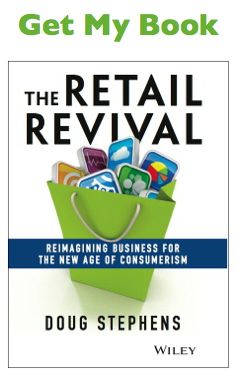
By Doug Stephens
In an astonishingly short period of time (about two decades), the developed world has evolved from a scarcity-based retail economy to one of unimaginable abundance. Consider that it wasn’t so long ago that consumers, lacking any other means of access, depended entirely on retailers for information on, and access to, new brands and products. To be successful, all a retailer had to do was be a relatively efficient and affordable pipeline.
In the digital age, however, the entire notion of scarcity is almost nostalgic. As consumers, we now operate on the assumption that we have access to practically whatever we want, whenever we want it, regardless of where it originates. Increasingly, we know we can short-circuit the supply chain entirely and deal directly with manufacturers and brands to get the things we want. And, if we own a 3D printer, we might already be making many day-to-day products in our own homes, sidestepping manufacturers altogether. Even big box inventories, which once seemed so vast, are now dwarfed relative to a bottomless sea of product choices, led by the likes of companies such as Amazon and Alibaba.
As a consequence, in this new era of abundance, the consumer’s challenge is no longer accessing the things we lack, but rather navigating the mind-boggling abundance of available choices that we already have.
The Transition From Value to Values
This brings with it an historic shift in what we need from the retailers we shop. We no longer rely on any one of them to be the pipeline to ever-growing assortments. Instead, we look to them to be an important filter; a conscientious curator that distills the endless universe of product possibilities into thoughtful assortments, based on a very clear set of operating values. These values might include things like quality, sustainability, community, luxury, wellness – or anything else, so long as it’s authentic, thoughtful, clearly articulated and perfectly in keeping with the brand’s actions.
Products Can Be Reverse Engineered. Values Can’t.
Great retailers seem to intuitively understand this. Whole Foods’ stated values hinge on “Selling the highest quality natural and organic products available.” Clothing brand Patagonia commits itself to “Build the best product, cause no unnecessary harm, use business to inspire and implement solutions to the environmental crisis.” Chipotle Mexican Grill is dedicated “finding the very best ingredients, raised with respect for the animals, the environment and the farmers.” Consequently, when consumers choose one of these brands, they’re actually buying into a set of values. In doing so, they entrust the brand to sift through the abundance of choices available and carry only those products that align with those values.
values hinge on “Selling the highest quality natural and organic products available.” Clothing brand Patagonia commits itself to “Build the best product, cause no unnecessary harm, use business to inspire and implement solutions to the environmental crisis.” Chipotle Mexican Grill is dedicated “finding the very best ingredients, raised with respect for the animals, the environment and the farmers.” Consequently, when consumers choose one of these brands, they’re actually buying into a set of values. In doing so, they entrust the brand to sift through the abundance of choices available and carry only those products that align with those values.
Despite this profound shift, the vast majority of retailers remain product and price obsessed – stuck in bygone era. If they ever had clearly articulated values, they’ve abandoned them in the name of competition. Ironically, this same detachment from strong core values makes them infinitely less competitive and vastly less differentiated.
In the scarcity economy, success meant selling your brand’s products at a value. In the new abundance economy, your brand’s values are the product.

